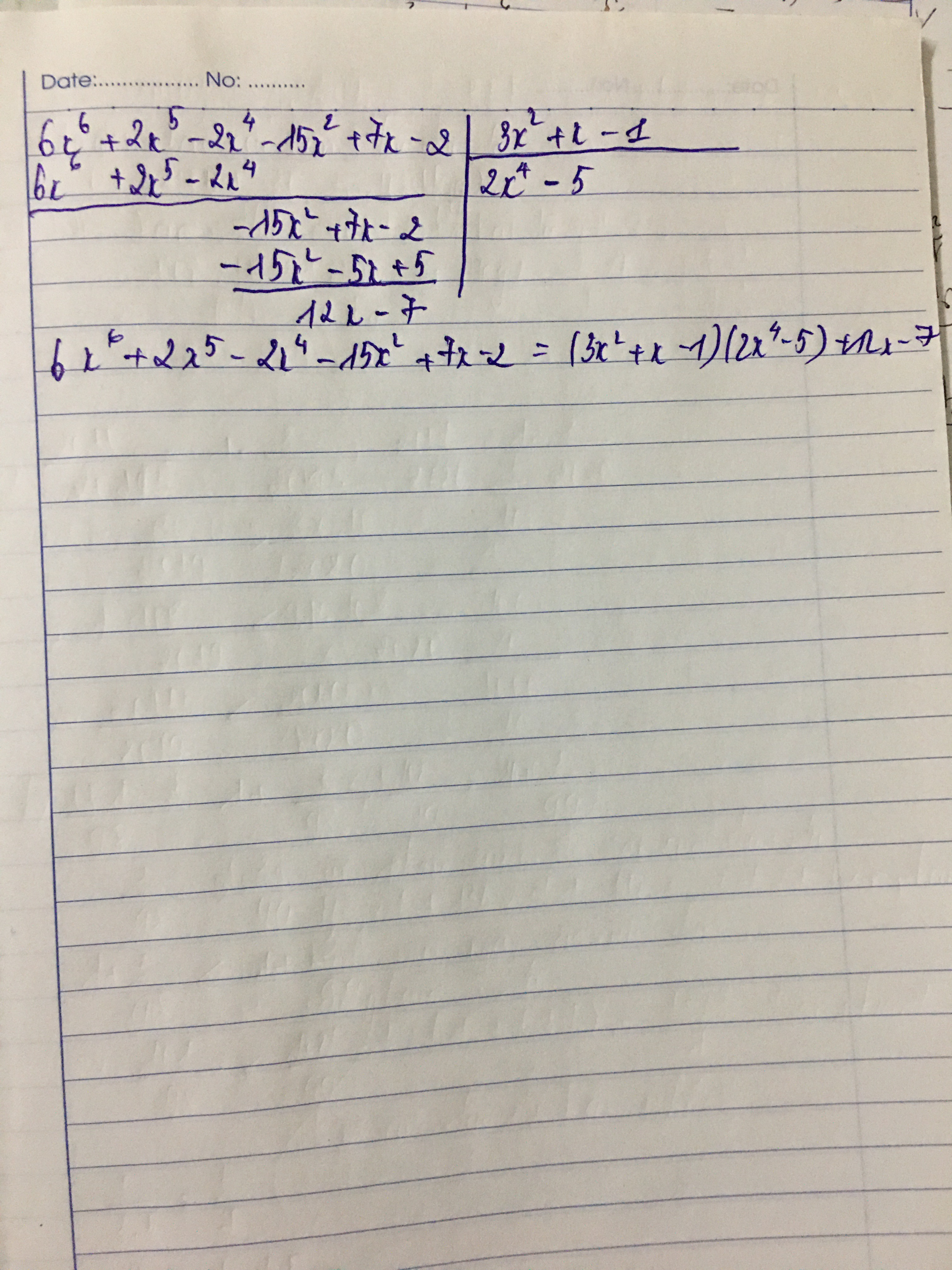
Hãy nhập câu hỏi của bạn vào đây, nếu là tài khoản VIP, bạn sẽ được ưu tiên trả lời.


* Trả lời:
\(\left(1\right)\) \(-3\left(1-2x\right)-4\left(1+3x\right)=-5x+5\)
\(\Leftrightarrow-3+6x-4-12x=-5x+5\)
\(\Leftrightarrow6x-12x+5x=3+4+5\)
\(\Leftrightarrow x=12\)
\(\left(2\right)\) \(3\left(2x-5\right)-6\left(1-4x\right)=-3x+7\)
\(\Leftrightarrow6x-15-6+24x=-3x+7\)
\(\Leftrightarrow6x+24x+3x=15+6+7\)
\(\Leftrightarrow33x=28\)
\(\Leftrightarrow x=\dfrac{28}{33}\)
\(\left(3\right)\) \(\left(1-3x\right)-2\left(3x-6\right)=-4x-5\)
\(\Leftrightarrow1-3x-6x+12=-4x-5\)
\(\Leftrightarrow-3x-6x+4x=-1-12-5\)
\(\Leftrightarrow-5x=-18\)
\(\Leftrightarrow x=\dfrac{18}{5}\)
\(\left(4\right)\) \(x\left(4x-3\right)-2x\left(2x-1\right)=5x-7\)
\(\Leftrightarrow4x^2-3x-4x^2+2x=5x-7\)
\(\Leftrightarrow-x-5x=-7\)
\(\Leftrightarrow-6x=-7\)
\(\Leftrightarrow x=\dfrac{7}{6}\)
\(\left(5\right)\) \(3x\left(2x-1\right)-6x\left(x+2\right)=-3x+4\)
\(\Leftrightarrow6x^2-3x-6x^2-12x=-3x+4\)
\(\Leftrightarrow-15x+3x=4\)
\(\Leftrightarrow-12x=4\)
\(\Leftrightarrow x=-\dfrac{1}{3}\)

Noob ơi, bạn phải đưa vào máy tính ý solve cái là ra x luôn, chỉ tội là đợi hơi lâu
a, 4.(18 - 5x) - 12(3x - 7) = 15(2x - 16) - 6(x + 14)
=> 72 - 20x - 36x + 84 = 30x - 240 - 6x - 84
=> (72 + 84) + (-20x - 36x) = (30x - 6x) + (-240 - 84)
=> 156 - 56x = 24x - 324
=> 24x + 56x = 324 + 156
=> 80x = 480
=> x = 480 : 80 = 6
Vậy x = 6

a: Khi x=1/3 thì \(A=3\cdot\dfrac{1}{9}-6\cdot\dfrac{1}{3}+5=\dfrac{10}{3}\)
Khi x=-2 thì \(A=3\cdot4-6\cdot\left(-2\right)+5=12+12+5=29\)
b: Trường hợp 1: x=2; y=-3
\(C=2\cdot2^2-3\cdot2\cdot\left(-3\right)+4\cdot\left(-3\right)^2=62\)
Trường hợp 2: x=-2; y=-3
\(C=2\cdot\left(-2\right)^2-3\cdot\left(-2\right)\cdot\left(-3\right)+4\cdot\left(-3\right)^2=26\)


c) \(\left(3x-1\right).\left(2x+7\right)-\left(x+1\right).\left(6x-5\right)=\left(x+2\right)-\left(x-5\right)\)
\(\Leftrightarrow6x^2+21x-2x-7-\left(6x^2-5x+6x-5\right)=x+2-x+5\)
\(\Leftrightarrow18x-2-7=0\)
\(\Rightarrow x=\dfrac{9}{18}=\dfrac{1}{2}\)
b) \(2.\left(3x-1\right).\left(2x+5\right)-6.\left(2x-1\right).\left(x+2\right)=1\)
\(\Leftrightarrow\left(6x-2\right).\left(2x+5\right)-\left(12x-6\right).\left(x+2\right)=1\)
\(\Leftrightarrow12x^2+30x-4x-10-\left(12x^2+24x-6x-12\right)=1\)
\(\Leftrightarrow12x^2+26x-10-12x^2-18x +12=1\)
\(\Leftrightarrow8x+2=1\)
\(\Rightarrow x=\dfrac{-1}{8}\)

a: =3x^3-15x^2+21x
b: =-x^3+6x^2+5x-4x^2-24x-20
=-x^3+2x^2-19x-20
c: =9x^2+15x-3x-5-7x^2-14
=2x^2+12x-19
d: =10x^2-4x+2/3

a: \(\Leftrightarrow12x^2-10x-12x^2-28x=7\)
=>-38x=7
hay x=-7/38
b: \(\Leftrightarrow-10x^2-5x+9x^2+6x+x^2-\dfrac{1}{2}x=0\)
=>1/2x=0
hay x=0
c: \(\Leftrightarrow18x^2-15x-18x^2-14x=15\)
=>-29x=15
hay x=-15/29
d: \(\Leftrightarrow x^2+2x-x-3=5\)
\(\Leftrightarrow x^2+x-8=0\)
\(\text{Δ}=1^2-4\cdot1\cdot\left(-8\right)=33>0\)
Do đó: Phương trình có hai nghiệm phân biệt là:
\(\left\{{}\begin{matrix}x_1=\dfrac{-1-\sqrt{33}}{2}\\x_2=\dfrac{-1+\sqrt{33}}{2}\end{matrix}\right.\)
e: \(\Leftrightarrow-15x^2+10x-10x^2-5x-5x=4\)
\(\Leftrightarrow-25x^2=4\)
\(\Leftrightarrow x^2=-\dfrac{4}{25}\left(loại\right)\)

Bài 1:
a) -6x + 3(7 + 2x)
= -6x + 21 + 6x
= (-6x + 6x) + 21
= 21
b) 15y - 5(6x + 3y)
= 15y - 30 - 15y
= (15y - 15y) - 30
= -30
c) x(2x + 1) - x2(x + 2) + (x3 - x + 3)
= 2x2 + x - x3 - 2x2 + x3 - x + 3
= (2x2 - 2x2) + (x - x) + (-x3 + x3) + 3
= 3
d) x(5x - 4)3x2(x - 1) ??? :V
Bài 2:
a) 3x + 2(5 - x) = 0
<=> 3x + 10 - 2x = 0
<=> x + 10 = 0
<=> x = -10
=> x = -10
b) 3x2 - 3x(-2 + x) = 36
<=> 3x2 + 2x - 3x2 = 36
<=> 6x = 36
<=> x = 6
=> x = 5
c) 5x(12x + 7) - 3x(20x - 5) = -100
<=> 60x2 + 35x - 60x2 + 15x = -100
<=> 50x = -100
<=> x = -2
=> x = -2

Bài 1:
- \(\dfrac{11}{2}x\) + 1 = \(\dfrac{1}{3}x-\dfrac{1}{4}\)
- \(\dfrac{11}{2}\)\(x\) - \(\dfrac{1}{3}\)\(x\) = - \(\dfrac{1}{4}\) - 1
-(\(\dfrac{33}{6}\) + \(\dfrac{2}{6}\))\(x\) = - \(\dfrac{5}{4}\)
- \(\dfrac{35}{6}\)\(x\) = - \(\dfrac{5}{4}\)
\(x=-\dfrac{5}{4}\) : (- \(\dfrac{35}{6}\))
\(x\) = \(\dfrac{3}{14}\)
Vậy \(x=\dfrac{3}{14}\)
Bài 2: 2\(x\) - \(\dfrac{2}{3}\) - 7\(x\) = \(\dfrac{3}{2}\) - 1
2\(x\) - 7\(x\) = \(\dfrac{3}{2}\) - 1 + \(\dfrac{2}{3}\)
- 5\(x\) = \(\dfrac{9}{6}\) - \(\dfrac{6}{6}\) + \(\dfrac{4}{6}\)
- 5\(x\) = \(\dfrac{7}{6}\)
\(x\) = \(\dfrac{7}{6}\) : (- 5)
\(x\) = - \(\dfrac{7}{30}\)
Vậy \(x=-\dfrac{7}{30}\)
